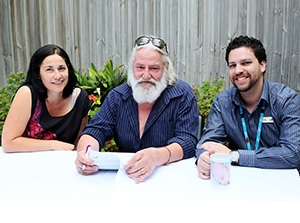Ophelia celebrates health literacy milestone
Research news
Many of us take for granted the ability to make an appointment with a doctor, follow prescription guidelines, or understand the consequences of poor hygiene, but for millions of others, such knowledge and resources can’t be taken for granted.
Health literacy is fundamental to everyone’s quality of life – and can mean the difference between life or death.
Led by Deakin University, with strong support from the Victorian Department of Health and Human Services, the collaborative Ophelia health literacy program has influenced health outcomes in Australia and over 20 countries since it was launched in August 2013.
Whether supporting vulnerable Victorians, a remote village in Scotland, or populations in Thailand or Africa, Ophelia is providing a systematic method for helping even the most disadvantaged people understand and access the care they need.
The just-completed first phase of the program, funded by the Australian Research Council, has been an outstanding success. According to project manager, Dr Alison Beauchamp, Ophelia’s momentum has only just begun, with numerous initiatives coming to fruition.
“We have developed and tested the Ophelia process – and shown that we have a robust system that is adaptable to communities,” she said.
Ophelia stands for Optimising Health Literacy and Access to health information and services. Dr Beauchamp explained that health literacy is not just about how people read, understand and access health information, but is “also about how we navigate through an increasingly complex health system. Ophelia is a fresh way for clinicians, hospitals and regions to understand and improve the healthcare they provide.”
“For instance, in many countries, more and more people are gaining health information from the Internet, but there are many who, for one reason or another, cannot access this information, and we are seeing greater inequalities between groups of people within countries.”
“Ophelia aims to provide communities or healthcare services with the tools they need to support people to obtain, process, and understand basic health information and services, so they can make appropriate health decisions.”
Initiated by Deakin’s Population Health Strategic Research Centre, the project has been a collaboration between Deakin University, the Victorian Department of Health, and Monash University.
It has focussed on improving health literacy both locally and globally. In Victoria, there have been nine project sites, including Barwon Health, the Royal District Nursing Service, and several local councils and community health providers. At these sites new health literacy interventions have been developed and trialled, of which many are now embedded within routine care.
At Barwon Health, Ophelia has facilitated a highly successful initiative to improve communication between clinicians and patients. The program uses several strategies, including one called “Teach-Back” to ensure patients with chronic and complex conditions fully understand how to apply medical instructions. It has achieved outstanding results in helping clinicians build stronger relationships with patients and is now part of routine care for the service.
“By responding to individual learning styles and getting the person to repeat back what they have understood, we can fill in the knowledge gaps,” said Janette Byrnes, a clinician from Barwon Health’s Hospital Admission Risk Program.
The Principal Investigator of the Ophelia study, Deakin’s Professor of Public Health, Richard Osborne, added that Ophelia has captured a “meaningful picture of where Victorians’ health literacy challenges are highest and provided our health organisations with a structured way to recognise and respond to the needs of the people they serve.”
He noted that organisations around the world are beginning to win grants based on the Ophelia approach to health system strengthening.
“Ophelia respects local wisdom and provides the tools to ensure that people are listened to and supported,” he said. “It has helped to change the approach and repertoire of public health managers and practitioners. We’re very proud that the work we are doing at Deakin is now reaching far and wide, and making real differences in the lives of ordinary people.”
Share this story
 Michelle Wilson and Robert Pereira, clinicians from Barwon Health’s Hospital Admission Risk Program, with client Gary Munday (centre).
Michelle Wilson and Robert Pereira, clinicians from Barwon Health’s Hospital Admission Risk Program, with client Gary Munday (centre).
